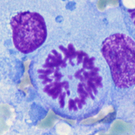
Researchers from the University of Athens and Penn State University have announced that in a study of newly diagnosed patients, elevated TIMP-1, a blood biomarker, correlated with more advanced multiple myeloma, poorer overall survival, and the presence of bone lesions.
TIMP-1 belongs to the family of “tissue inhibitors of metalloproteinases,” a group of proteins that help regulate bone turnover – the removal of old bone tissue (resorption) and the addition of new bone tissue (ossification). Through multiple molecular pathways, excess …
Read the full story »

According to the results of a new study in the journal Annals of Hematology, successfully treating H. pylori, a common bacterial infection, does not lead to monoclonal gammopathy of undetermined significance (MGUS) remission.
These results, also supported by other researchers’ work, refute a previous study that suggested H. pylori eradication could cure approximately 30 percent of MGUS cases.
MGUS is an asymptomatic blood disorder characterized by an abnormally elevated level of monoclonal protein, which is often discovered during …
Read the full story »

Researchers have announced that in initial tests, a multiple myeloma vaccine protected some mice from developing cancer and helped those with established tumors to enter remission.
In the current study, researchers constructed an anti-myeloma vaccine by isolating proteins from myeloma tumor cells. After inoculation, the vaccine prompts antibodies to develop against myeloma proteins, which in turn causes the immune system to view myeloma cells as “foreign” and destroy them. This form of cancer treatment, known as “immunotherapy,” provides an alternative …
Read the full story »

The U.S. Food and Drug Administration has approved a Phase 3 clinical trial evaluating perifosine in relapsed and refractory multiple myeloma patients. Perifosine, also known as KRX-0401, is an oral anti-cancer agent being developed by Aeterna Zentaris and licensed in the U.S., Canada, and Mexico by Keryx Biopharmaceuticals.
The trial, entitled “A Phase 3 Randomized Study to Assess the Efficacy and Safety of Perifosine Added to the Combination of Bortezomib and Dexamethasone in Multiple Myeloma Patients Previously Treated with Bortezomib,” …
Read the full story »

For the first time, researchers have sequenced the full multiple myeloma genome.
Sequencing the full multiple myeloma genome enables scientists to discover which genes are present in a myeloma tumor, as well as to determine which genetic regions may harbor mutations. This knowledge will help researchers better understand both myeloma’s development -- how normal plasma cells in the bone marrow transform into cancerous ones – and new, tailored targets for attacking the disease.
This genetic reconstruction project by the Multiple …
Read the full story »

Researchers have announced that current clinical treatment guidelines do not adequately incorporate quality of life considerations and are calling for increased attention to the “patient perspective” in myeloma treatment.. Presently, few studies have examined quality of life issues. For those that have, their results have often failed to have a meaningful effect on clinical decision-making.
A study in the European Journal of Haematology identified 15 high-quality clinical trials since 1990 that included quality of life as a principal focus. These …
Read the full story »

Researchers have discovered that variants in XRCC5, a DNA repair gene, are associated with greater blood clot risk during thalidomide (Thalomid) therapy. Although researchers remain unsure of the precise mechanism underlying XRCC5’s contribution to clot formation, they hope that genetic screening could one day identify high-risk patients requiring more intensive preventative intervention.
Blood clots, in particular deep vein thrombosis – which is a clot within the deep veins of the body – can be a serious and potentially fatal …
Read the full story »

